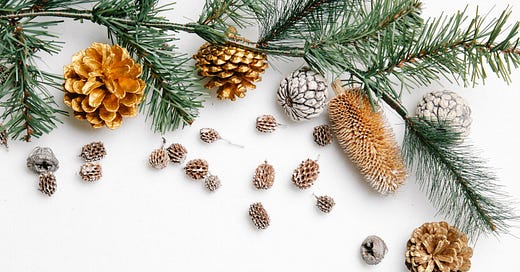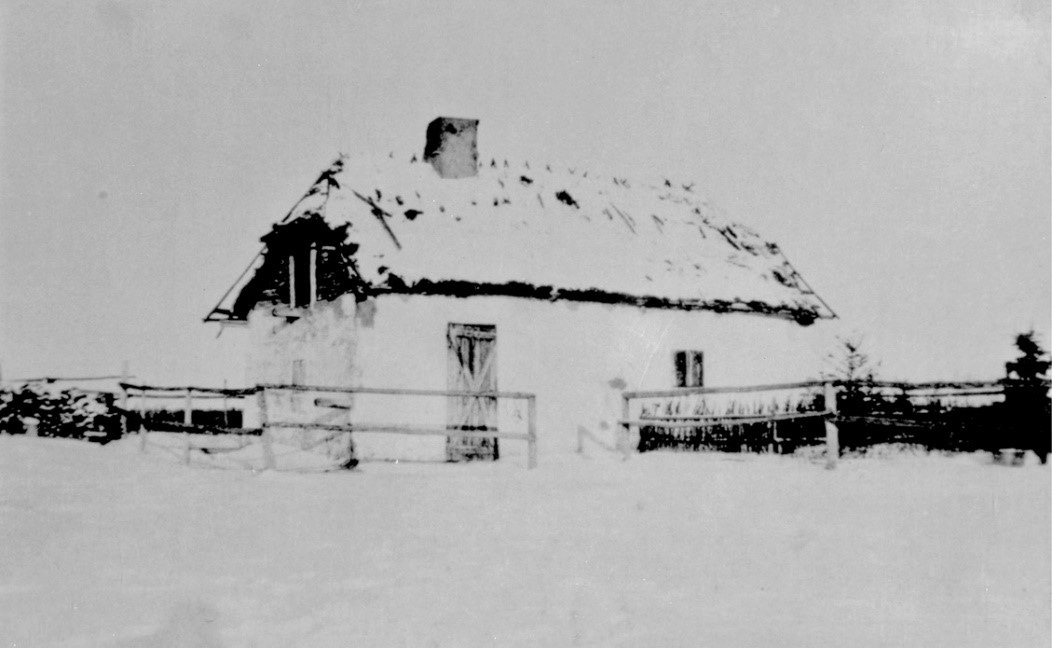It was the early 1930s, and the six Dimchinski brothers had lost their parents and a third of their land. They were poorer than ever.
Joe, the oldest, barely twenty, was in charge. He managed the farm with help from neighbours who lent a hand when they could. Peter, the next oldest, became the cook and baked bread in the clay oven next to the house. Eventually, the three older boys picked up enough skills to take turns in the kitchen. My father, Stan, was the second youngest. He was still a child.
While their neighbours were building board-sided houses with shingled roofs, the Dimchinskis still lived in two rooms enclosed by mud-and-plaster walls and thatch that no longer held back the elements. A photo from that period shows the house in winter, ragged thatch poking through the snow. The entrance to the attic gapes dark and open. Thatch needed to be regularly replaced. Older people like their grandfather, who had built the house decades earlier, knew how to thatch, but it was becoming a lost art.
Winters were hardest. The wood-burning stove went out before dawn, and water froze in the bucket. It had to be fetched from the well the night before to avoid having to draw it first thing in the morning. Bathing was with a sponge, the water heated on the stove. There was no indoor toilet. Instead, a chamber pot was used at night.
They didn’t know how poor they were because they were not much worse off than the families around them, the Hrywkiws, with their many children, the Barlishens who had lost their mother in the flu epidemic.
The brothers were bound by the customs they grew up with and the remnants of their faith. Nearby Gogol School , named for the family that had supplied the land on which it was built, had taught them English, but the language and traditions at home were Ukrainian. Christmas was now doubly celebrated on December 24-25, thanks to the Canadian school holiday, and again on January 6, following the calendar of the Ukrainian Catholic Church, which practiced the Orthodox rite.
Straw was placed under the table, representing the manger where Christ was born. A place was set for those whom death had taken. On Christmas Eve twelve meatless dishes were served, one for each apostle. First among these was kutia, the cold soup made of boiled wheat, poppy seed and honey. In Ukrainian belief, poppy evokes the sleep of death; wheat, ever returning in spring, the Second Coming and resurrection of the dead; honey the sweetness of Paradise.
Their parents Katie and Martin, had perhaps explained the symbolism to their children, or maybe not. Observance was more important than knowing. Custom was a way of remembering. Katie and Martin were gone, but they had left a gift: the solidarity of family around the table.
Besides the homemade fare, Joe bought apples, oranges and nuts from town. These Christmas treats were stored in the root cellar underneath the floor and rationed. My father and his brother Mike sneaked below at night to take a bit more than their allotment. If the thievery was noticed, it was not mentioned.
There were no presents as such, but one Christmas Joe gave each brother a special treat – his own tin of sardines. In later years, my father spoke of this as his most cherished Christmas gift. This puzzled me.
“Dad,” I said. “I don’t get it with the sardines. There was always enough to eat, and you shared everything. You and your brothers were so close, and you depended on each other. What was so special about a tin of sardines?”
“Because,” my father said, “It was something that was mine. It was just for me.”
I hadn’t understood because I was never poor thanks to him.
This vignette is from a work in progress recounting the lives and times of the author’s family.
The Dimchinski family home near Canora, Saskatchewan








I too love a tin of sardines, and now I'll never open one without thinking of this story and how special one can be if it's just for you.
Fantastic piece, Bryan! Makes you want to read more!